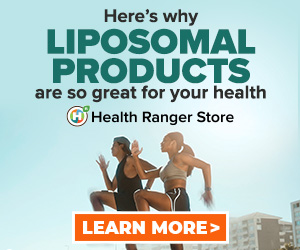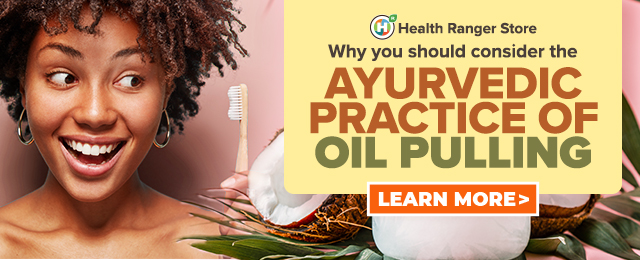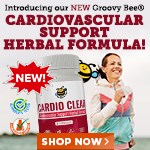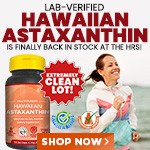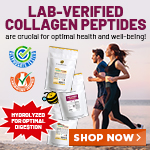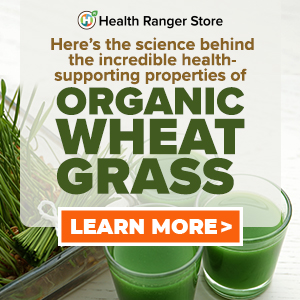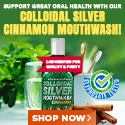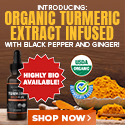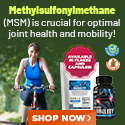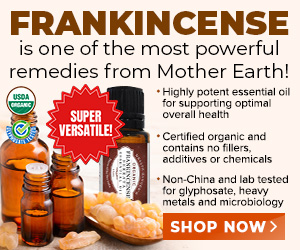
How to lower your cholesterol absolutely free (no prescription required)
 Wednesday, July 28, 2004 Wednesday, July 28, 2004by Mike Adams, the Health Ranger Editor of NaturalNews.com (See all articles...) Tags: statin drugs, statins, high cholesterol |
- Aerosolized bioweapons? Strange “diploid biomasses” falling out of the sky in Florida captured under the microscope
- Tesla unveils enhanced Optimus robot, now walks better than Joe Biden!
- Newly released JFK files reveal Pentagon's role in creating Lyme disease and covid in the same lab
- Dr. Mary Talley Bowden drops bombshells about children being permanently damaged by mRNA jabs during Tucker Carlson interview
- COVID mRNA injections linked to genetic changes that increase brain tumor and leukemia risk
- “Immortality Herb” becoming more popular as an ADAPTOGEN – providing stress relief and immune modulation
- Florida skies contaminated: Shocking levels of aluminum, mercury, and lead found in atmospheric fallout
- Trump’s tariff shockwave sends Wall Street reeling as global recession fears mount
- After Jenny McCarthy's son got AUTISM FROM MMR VACCINE, a PR Firm was hired by U.S. government agency to label her an "ANTI-VACCINE KOOK"
- Staying connected: The essential guide to disaster communication by Jim Cobb
- Microsoft scales back AI data center boom as China's DeepSeek upends the market
- Defunding DEADLY mRNA jabs: Government funding for mRNA technology being scrutinized and sidelined until proven "safe and effective" for real
- Tofu: Health benefits, nutrients and how to eat this superfood
- “Prepare Tribe: Prepare, Protect, Provide” on BrightU: Effective homesteading techniques and medical must-haves
- Former CDC Director advocates for additional MMR dose for babies, going against decades of vaccine safety recommendations
- Trump’s shift in policy could save American farmers from climate regulations and bureaucratic red tape
- Tornado outbreak and flash floods gripping the Midwest: Days of devastation await
- California’s gas prices: A crisis of its own making, USC study finds
- Newly released JFK files reveal Pentagon's role in creating Lyme disease and covid in the same lab
- European Court of Justice: Healthcare professionals who promoted or administered COVID-19 vaccines are CRIMINALLY LIABLE for any harm caused
- Oncologist warns of ‘terrifyingly aggressive’ cancers in children, linked to immune suppression from COVID vaccines
- Kiss Your Genetic Privacy Good-Bye! 23andMe Gets Green Light to Sell Your Intimate Genetic Details to Anyone They Want
- Aerosolized bioweapons? Strange “diploid biomasses” falling out of the sky in Florida captured under the microscope
- Analysis: The coming economic collapse, a mass uprising and Trump's three secret weapons to halt the growing revolt
- Britain’s descent into police state censorship: Parents raided for questioning their daughter’s school system online
- AI weather model outperforms traditional forecasts, boosts accuracy by 20%
- Woman contracts WORLD'S DEADLIEST VIRUS after unknowingly being given the WRONG VACCINE
- NIH study, buried for decades, reveals that Flu Shots INCREASE elderly deaths, not prevent them
- Utah governor allows ban on LGBT pride flags in public buildings and schools, will take effect without his signature
- DARPA: The shadowy innovator behind the world’s most advanced military technologies
- The Health Ranger releases “Vaccine Zombie” song and music video, using AI-animated zombies for the music video
- COVID-19 scandal linked to CANCER SURGE: Billionaire researcher sounds alarm
- Musk targets “strangely wealthy” lawmakers in DOGE probe, names Pelosi, McConnell, Schumer
- Mike Adams releases country western hit single: Goin’ Back in Time is Comin’ Home
- When antibiotics are unavailable, natural ANTIMICROBIAL compounds become essential first line defenses against infection
- Ancient kitchen secrets REVEALED: How garlic, ginger and green onions fight cancer and heart disease
- Newly released JFK files reveal Pentagon's role in creating Lyme disease and covid in the same lab
- California's social media censorship law struck down: A victory for free speech or a threat to online safety?
- The Health Ranger releases “Vaccine Zombie” song and music video, using AI-animated zombies for the music video
- Dr. Mike Yeadon releases 15-minute testimony - WATCH - about genocidal intent of COVID “vaccines”
- EPA advisor admits the agency is funneling billions to climate groups ahead of Trump’s return to White House
- Florida takes a stand: DeSantis proposes permanent ban on mRNA vaccine mandates
- Rep. Nancy Mace introduces bill to ban biological males from female facilities on federal property
- Sugarcane extract superior to cholesterol-lowering drugs?
- Mike Adams releases country western hit single: Goin’ Back in Time is Comin’ Home
- Survival 101: Effective EMF blocking techniques
- “Why we influenced the 2020 elections”: Facebook files reveal the coordinated effort to bury the Hunter Biden laptop story
- Unpacking the Lies That We’ve Been Fed – new song and music video released by Mike Adams, the Health Ranger
- Attorney and TikTok influencer explains how he was offered hundreds of dollars to make false claims about Trump, Republicans
- OpenAI whistleblower who dissented against how the company trained ChatGPT found dead
- House Intelligence Committee calls for the ARREST and PROSECUTION of Dr. Anthony Fauci
- CONSERVATIVES SOUND THE ALARM: Big Pharma and the Left trying to force $32 billion money grab from America’s seniors into year-end spending deal
- Pilots report mysterious lights 'moving at extreme speeds' across Oregon skies
- Midair collision near D.C. kills 67; Questions mount over preventable tragedy
- Red Cross issues warning to stop blood plasma donations from vaccinated people
- Scientists confirm: GENIUS brain function can be spontaneously unleashed in humans without any apparent cause
- EPA advisor admits the agency is funneling billions to climate groups ahead of Trump’s return to White House
- HYSSOP: What research reveals about the health benefits of this ancient holy herb
- Two containers with completed ballots fall out of truck in Florida
- Fully vaccinated about to see “tsunami” of illness and death, warns virologist
- Global leaders unite to clamp down on “misinformation” with UN-backed Cascais Declaration
- BREAKING: 2025 NDAA authorizes mandatory military draft of WOMEN across America… as Pentagon pursues global NUCLEAR war with both Russia and China at the same time
- Michael Yon warns of a ZIONIST TAKEOVER in Trump’s second administration
- Newly released JFK files reveal Pentagon's role in creating Lyme disease and covid in the same lab
- BOMBSHELL: DNA testing kits are a SCAM to develop ethnic-specific bioweapons
- Ozempic and Wegovy weight loss drugs are injectable LIZARD VENOM PEPTIDES that may unleash a devastating wave of organ failure… side effects align with symptoms of SNAKE BITES
- Israeli soldiers accused of even more torture and abuse in the West Bank
- These 13 countries just signed an agreement to engineer a global FAMINE by destroying food supply
- The Health Ranger releases “Vaccine Zombie” song and music video, using AI-animated zombies for the music video
- NASA admits that climate change occurs because of changes in Earth’s solar orbit, and NOT because of SUVs and fossil fuels
- RFK Jr. clears key hurdle: Sen. Susan Collins backs controversial HHS nominee, signaling a new era for health policy
- Sermon 30: How Jesus reveals Caesar’s FAKE CURRENCY and FALSE AUTHORITY
But let's get back to reality for a second here -- high cholesterol is not caused by a lack of statin drugs. High cholesterol is caused by lifestyle choices, such as consuming certain foods and avoiding physical exercise, and the only natural way to lower cholesterol also happens to be a completely cost-free way to do so: by changing the foods you purchase and consume and by engaging in regular physical exercise. Doing so will cause your cholesterol levels to plummet on their own, without needing dangerous prescription drugs.
The information I'll share with you here is exactly what I followed to achieve an LDL cholesterol of 67 and HDL cholesterol of 62. Of course, I wouldn't touch prescription drugs. These results were achieved through nothing but nutrition, superfoods and physical exercise.
There is little doubt that the recent guidelines about lowering cholesterol were timed to coincide with the recent marketing push for highly-profitable statin drugs; in fact, six of the nine board members who issued the cholesterol-lowering guidelines have financial ties to the pharmaceutical companies that manufacture these drugs, and yet they failed to disclose these financial ties in their report, violating ethical practices in medicine.
Good doctors will tell people with high cholesterol to alter their lifestyle first. They will ask them about what they're eating and how much exercise they're getting, and recommend that they change foods to consume fewer cholesterol-raising foods and greater quantities of cholesterol-lowering foods. They will also recommend that their patients engage in frequent cardiovascular exercise, which of course has a positive impact on cholesterol.
Statin drugs should be the last resort, or a temporary treatment if used at all. They can help give the patient temporary assistance while they make lifestyle changes that will bring cholesterol back into balance on their own. But a lifetime on statin drugs is not a healthy strategy. Clearly the human body was not designed to survive on a daily intake of prescription drugs. So how do you actually lower your cholesterol for free? What's the nitty-gritty of the advice here? Let's get down to it.
First thing to do is remove foods from your diet that are causing high cholesterol in the first place. There are two ingredients to watch out for here. Number one is hydrogenated oils, also known as partially hydrogenated oils. These oils are found in most margarine products and virtually all baked goods such as cookies, crackers, pastries, and so on. They're even found in many salad dressings and soups, believe it or not. You actually have to read the ingredients labels and make sure you aren't ingesting hydrogenated oils.
It is the hydrogenation of these oils that makes them toxic to the human body. They belong to a class of ingredients known as metabolic disruptors. This is a class of ingredients that interferes with normal human metabolism and includes ingredients like sodium nitrite, MSG, aspartame, and white flour.
The second ingredient to avoid if you want to keep your cholesterol down is saturated animal fat -- the animal fat found in beef and other red meats. Certainly you don't want to be eating lard or anything cooked with lard, and you want to consider limiting or completely avoid consuming red meat.
Other foods that will raise your bad cholesterol level include foods made with unhealthy or cheap oils such as soybean oil. There's nothing really wrong with soybean oil, it's just that it's not especially healthy, and it's one of the cheapest oils out there, so most people get far too much of it and not enough of the healthy oils. But we'll talk about the good fats in a minute.
Finally, avoid processed foods. That includes any food that is manufactured and comes in a pretty package. Virtually all processed foods are unhealthy foods, and the more a food has been processed and perverted from its original, natural form, the less healthy it's going to be, and the more likely it will raise your LDL cholesterol.
Now let's talk about foods you can eat that will lower your LDL cholesterol and raise your HDL cholesterol. These include the healthy oils, sometimes called the "good fats" -- items such as omega-3 oils, found in flaxseeds. You can also get healthy oils by consuming extra-virgin olive oil, extra-virgin coconut oil, or by eating nuts like macadamias, pecans, cashews, and peanuts. Even peanut oil is quite healthy for you, as long as you're not buying peanut butter made with hydrogenated oils, as most peanut butter products are. Look for the Adams brand peanut butter. It's the one where the oil has separated from the rest of the peanut butter, and that's how you know it has no hydrogenated oils.
Beyond the healthy fats, there are also a variety of groceries that can help you lower your cholesterol levels, such as garlic, ginger, onions, and basically any fruits and vegetables that are not processed or overcooked. Whole grains, such as kamut, pearled barley, whole grain oats, or wheat berries can also help reduce cholesterol by giving you extra fiber that interferes with the absorption of cholesterol-promoting fats.
Moving on to the supplementation side, there are a great number of nutritional supplements that can help you lower cholesterol naturally without using drugs. One such nutritional supplement is red yeast rice, an item that has been oppressed by the FDA. In fact, the FDA has attempted to outlaw and regulate this substance, claiming it is a drug because it lowers cholesterol so effectively. In fact, red yeast rice was found to be more effective than statin drugs in lowering cholesterol, and of course the FDA can't stand for anything in the natural market to work so well, so they have to do their best to wipe it out, or at least make it illegal to sell to consumers. Garlic is another popular supplement with well-documented cholesterol-lowering effects. In addition to eating garlic as part of your diet, you can take garlic supplements that will further accelerate your cholesterol decline.
Superfoods are also extremely helpful for lowering high cholesterol and enhancing your overall body health. I talk quite a bit about superfoods. These are items that I personally consume on a daily basis and that I strongly recommend to others. Of course, my own LDL cholesterol is considered extraordinarily low (67), so I do know what I'm talking about here. My favorite superfoods include chlorella, spirulina, sea vegetables, soy products such as soy milk, soy cheese, or tofu, any sprouts, such as wheat grass, broccoli sprouts, barley grass or clover sprouts, and also the supergrains such as quinoa, millet, and kamut. In addition, I recommend organic, whole-food vitamin supplements -- supplements that are made exclusively from whole-food sources and not from isolated chemical vitamins, as well as coral calcium, which is an outstanding source of not only calcium, but also magnesium, zinc, and trace minerals from the ocean.
Just in case this hasn't been enough advice yet, let's bring in physical exercise, because regular exercise is a crucial point when considering cardiovascular health and cholesterol levels. By engaging in regular physical exercise -- that is, at least 5 hours a week -- you can dramatically reduce your bad cholesterol levels and lose weight at the same time. Of course, this probably isn't new information to you, since we all know that exercise is good for us, but few people tend to consider exercise as a cholesterol-lowering strategy. In reality, it's far more powerful than any prescription drug in existence!
If you put all of this together, you have an unbeatable strategy that actually costs you nothing. In fact, the foods mentioned here will save you so much money over the brand-name foods you might have normally been purchasing that you'll have plenty of money left over to purchase superfood supplements. For example, a pound of quinoa can be purchased for as little as three or four dollars, and yet can provide a healthy whole grain for several weeks of cooking. Fresh fruits and vegetables are extremely inexpensive compared to the high markups on manufactured foods like breakfast cereals, dinner mixes, frozen foods, and microwavable meals.
Your money will go much further when you're choosing healthy foods to begin with. And of course the exercise part of this is free of charge, or if you decide to join a gym, the monthly fees are inconsequential compared to the cost of a lifetime of addiction to prescription drugs and visits to your physician.
Now, with all that said, let me repeat that a good doctor -- that is, a doctor that is genuinely concerned with your health and who is well-informed about the relationships between nutrition and disease -- would be telling you all of this in the first place. A bad doctor, -- a doctor steeped in Western medicine and brainwashed by the pharmaceutical industry into ignoring nutrition and focusing on drugs -- would recommend little more than taking statin drugs, and would be happy to write you a couple of prescriptions and get you out of his way so he can see the next patient. It's easy to tell if you have a good doctor or a bad doctor by simply visiting him or her and asking what you should do about your high cholesterol. Their answer reveals their level of health wisdom.
In addition to good doctors and bad doctors, however, there are also good patients and bad patients. What I mean by this is demonstrated in the following example. Many people ask me how they can lower their cholesterol naturally, and when they do, I typically tell them the same thing that I've related here in this commentary. I tell them if you do all of these things, if you avoid these foods, if you take these supplements, if you eat these other foods, and if you engage in regular physical exercise, your LDL cholesterol will drop naturally and will maintain a level well below 70. They usually interrupt me at some point in this conversation and say something similar to the following: "No, what I meant was, how can I lower my cholesterol without actually doing anything?"
For those people, statin drugs are the perfect answer. You don't have to do anything but take statin drugs every day, pay the bill, and of course, run the risk of damaging other organs in your body from a lifetime of exposure to toxic prescription drugs such as statins. (These drugs are now being shown to cause birth defects, by the way...) Your sex hormone production will be disrupted, your liver function will be impaired, and your body's ability to manufacture the natural levels of cholesterol it needs to function properly will also be dramatically lowered. But if you don't want to do anything, and still desire a lower level of cholesterol, and don't care about abusing your body, then statin drugs are certainly one way to accomplish that.
The bottom line to all of this is that a good patient doesn't even need to visit a doctor to lower their own cholesterol. All they need to do is take responsibility for their health, start pursuing a lifestyle with healthy foods, outstanding nutrition, and frequent physical exercise, and then, if they were to ever visit a doctor, that doctor would simply say, "Hey, your cholesterol is perfectly normal. Good job."
Statin drugs at FETCH.news
Get independent news alerts on natural cures, food lab tests, cannabis medicine, science, robotics, drones, privacy and more.
 About the author:Mike Adams (aka the "Health Ranger") is a best selling author (#1 best selling science book on Amazon.com) and a globally recognized scientific researcher in clean foods. He serves as the founding editor of NaturalNews.com and the lab science director of an internationally accredited (ISO 17025) analytical laboratory known as CWC Labs. There, he was awarded a Certificate of Excellence for achieving extremely high accuracy in the analysis of toxic elements in unknown water samples using ICP-MS instrumentation. Adams is also highly proficient in running liquid chromatography, ion chromatography and mass spectrometry time-of-flight analytical instrumentation.
About the author:Mike Adams (aka the "Health Ranger") is a best selling author (#1 best selling science book on Amazon.com) and a globally recognized scientific researcher in clean foods. He serves as the founding editor of NaturalNews.com and the lab science director of an internationally accredited (ISO 17025) analytical laboratory known as CWC Labs. There, he was awarded a Certificate of Excellence for achieving extremely high accuracy in the analysis of toxic elements in unknown water samples using ICP-MS instrumentation. Adams is also highly proficient in running liquid chromatography, ion chromatography and mass spectrometry time-of-flight analytical instrumentation.
Adams is a person of color whose ancestors include Africans and Native American Indians. He's also of Native American heritage, which he credits as inspiring his "Health Ranger" passion for protecting life and nature against the destruction caused by chemicals, heavy metals and other forms of pollution.
Adams is the founder and publisher of the open source science journal Natural Science Journal, the author of numerous peer-reviewed science papers published by the journal, and the author of the world's first book that published ICP-MS heavy metals analysis results for foods, dietary supplements, pet food, spices and fast food. The book is entitled Food Forensics and is published by BenBella Books.
In his laboratory research, Adams has made numerous food safety breakthroughs such as revealing rice protein products imported from Asia to be contaminated with toxic heavy metals like lead, cadmium and tungsten. Adams was the first food science researcher to document high levels of tungsten in superfoods. He also discovered over 11 ppm lead in imported mangosteen powder, and led an industry-wide voluntary agreement to limit heavy metals in rice protein products.
In addition to his lab work, Adams is also the (non-paid) executive director of the non-profit Consumer Wellness Center (CWC), an organization that redirects 100% of its donations receipts to grant programs that teach children and women how to grow their own food or vastly improve their nutrition. Through the non-profit CWC, Adams also launched Nutrition Rescue, a program that donates essential vitamins to people in need. Click here to see some of the CWC success stories.
With a background in science and software technology, Adams is the original founder of the email newsletter technology company known as Arial Software. Using his technical experience combined with his love for natural health, Adams developed and deployed the content management system currently driving NaturalNews.com. He also engineered the high-level statistical algorithms that power SCIENCE.naturalnews.com, a massive research resource featuring over 10 million scientific studies.
Adams is well known for his incredibly popular consumer activism video blowing the lid on fake blueberries used throughout the food supply. He has also exposed "strange fibers" found in Chicken McNuggets, fake academic credentials of so-called health "gurus," dangerous "detox" products imported as battery acid and sold for oral consumption, fake acai berry scams, the California raw milk raids, the vaccine research fraud revealed by industry whistleblowers and many other topics.
Adams has also helped defend the rights of home gardeners and protect the medical freedom rights of parents. Adams is widely recognized to have made a remarkable global impact on issues like GMOs, vaccines, nutrition therapies, human consciousness.
In addition to his activism, Adams is an accomplished musician who has released over a dozen popular songs covering a variety of activism topics.
Click here to read a more detailed bio on Mike Adams, the Health Ranger, at HealthRanger.com.
Take Action: Support Natural News by linking to this article from your website
Permalink to this article:
Embed article link: (copy HTML code below):
Reprinting this article:
Non-commercial use OK, cite NaturalNews.com with clickable link.
Follow Natural News on Facebook, Twitter, Google Plus, and Pinterest
Science News & Studies
Medicine News and Information
Food News & Studies
Health News & Studies
Herbs News & Information
Pollution News & Studies
Cancer News & Studies
Climate News & Studies
Survival News & Information
Gear News & Information
News covering technology, stocks, hackers, and more



"Big Tech and mainstream media are constantly trying to silence the independent voices that dare to bring you the truth about toxic food ingredients, dangerous medications and the failed, fraudulent science of the profit-driven medical establishment.
Email is one of the best ways to make sure you stay informed, without the censorship of the tech giants (Google, Apple, Facebook, Twitter, YouTube, etc.). Stay informed and you'll even likely learn information that may help save your own life."
–The Health Ranger, Mike Adams











